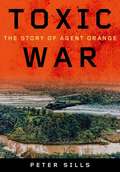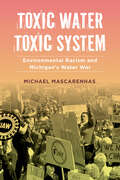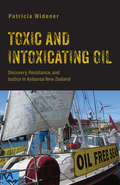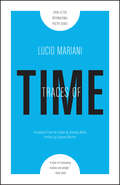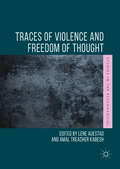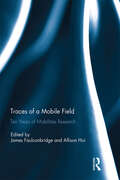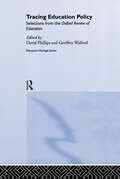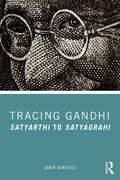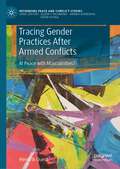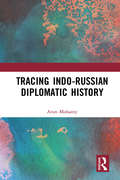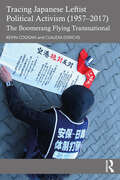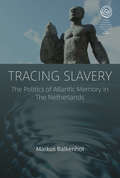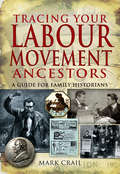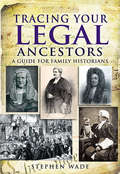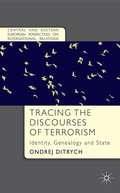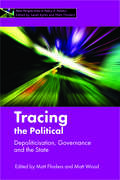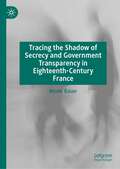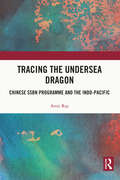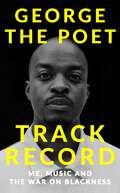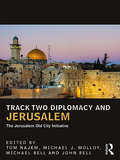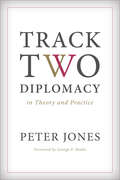- Table View
- List View
Toxic War: The Story of Agent Orange
by Peter SillsThe war in Vietnam, spanning more than twenty years, was one of the most divisive conflicts ever to envelop the United States, and its complexity and consequences did not end with the fall of Saigon in 1975. As Peter Sills demonstrates in Toxic War, veterans faced a new enemy beyond post-traumatic stress disorder or debilitating battle injuries. Many of them faced a new, more pernicious, slow-killing enemy: the cancerous effects of Agent Orange. Originally introduced by Dow and other chemical companies as a herbicide in the United States and adopted by the military as a method of deforesting the war zone of Vietnam, in order to deny the enemy cover, Agent Orange also found its way into the systems of numerous active-duty soldiers. Sills argues that manufacturers understood the dangers of this compound and did nothing to protect American soldiers.Toxic War takes the reader behind the scenes into the halls of political power and industry, where the debates about the use of Agent Orange and its potential side effects raged. In the end, the only way these veterans could seek justice was in the court of law and public opinion. Unprecedented in its access to legal, medical, and government documentation, as well as to the personal testimonies of veterans, Toxic War endeavors to explore all sides of this epic battle.
Toxic Warfare
by Theodore W. KarasikThe past several years have seen an increase in the use of toxic weapons -- i.e., inexpensive and easily acquired chemicals and industrial waste -- on the part of state as well as nonstate actors. Nonetheless, little analysis has been done on the nature and extent of this threat either to the military or to the U.S. homeland. This report examines the implications of toxic weapon use for military planning and concludes that such weapons merit further analysis.
Toxic Water, Toxic System: Environmental Racism and Michigan's Water War
by Prof. Michael MascarenhasThe tireless resistance of local communities fighting for ownership of America’s third largest water system Toxic Water, Toxic System exposes the consequences of a seemingly anonymous authoritarian state willing to maintain white supremacy at any cost—including poisoning an entire city and shutting off water to thousands of people. Weaving together narratives of frontline activists along with archival data, Michael Mascarenhas provides a powerful exploration of the political alliances and bureaucratic mechanisms that uphold inequality. Drawing from three years of ethnographic fieldwork in Flint and Detroit, this book amplifies the voices of marginalized communities, particularly African American women, whose perspectives and labor have been consistently overlooked. Toxic Water, Toxic System offers a fresh perspective on the ties between urban austerity policies, environmental harm, and the advancement of white supremacist agendas in predominantly Black and brown cities.
Toxic and Intoxicating Oil: Discovery, Resistance, and Justice in Aotearoa New Zealand (Nature, Society, and Culture)
by Patricia WidenerWhen oil and gas exploration was expanding across Aotearoa New Zealand, Patricia Widener was there interviewing affected residents and environmental and climate activists, and attending community meetings and anti-drilling rallies. Exploration was occurring on an unprecedented scale when oil disasters dwelled in recent memory, socioecological worries were high, campaigns for climate action were becoming global, and transitioning toward a low carbon society seemed possible. Yet unlike other communities who have experienced either an oil spill, or hydraulic fracturing, or offshore exploration, or climate fears, or disputes over unresolved Indigenous claims, New Zealanders were facing each one almost simultaneously. Collectively, these grievances created the foundation for an organized civil society to construct and then magnify a comprehensive critical oil narrative--in dialogue, practice, and aspiration. Community advocates and socioecological activists mobilized for their health and well-being, for their neighborhoods and beaches, for Planet Earth and Planet Ocean, and for terrestrial and aquatic species and ecosystems. They rallied against toxic, climate-altering pollution; the extraction of fossil fuels; a myriad of historic and contemporary inequities; and for local, just, and sustainable communities, ecologies, economies, and/or energy sources. In this allied ethnography, quotes are used extensively to convey the tenor of some of the country’s most passionate and committed people. By analyzing the intersections of a social movement and the political economy of oil, Widener reveals a nuanced story of oil resistance and promotion at a time when many anti-drilling activists believed themselves to be on the front lines of the industry’s inevitable decline.
Toxin and Bioregulator Weapons: Preventing the Misuse of the Chemical and Life Sciences (Global Issues)
by Michael Crowley Malcolm R. DandoThis book explores how revolutionary developments and convergence of the chemical, life and associated sciences are impacting contemporary toxin and bioregulator research, and examines the risks of such research being misused for malign purposes. Investigating illustrative cases of dual use research of potential concern in China, India, Iran, Russia, Syria and the USA, the authors discuss how states can ensure such research and related activities are not utilised in weapons development. Although toxins and bioregulators are, in theory, covered by both the Biological and Toxin Weapons Convention and Chemical Weapons Convention, this apparent overlap in reality masks a dangerous regulatory gap – with neither Convention implemented effectively to address threats of weaponisation. This book highlights the potentially damaging consequences for international peace and security, and proposes realistic routes for action by states and the scientific community.
Traces of Time
by Lucio Mariani Anthony Molino"Mariani has emerged as one of the few significant post-Montalian poets in Italy, and Molino is a graceful, experienced, thoroughly reliable translator. The result is an elegant book, an important book, bringing a distinctive voice into English."--Rosanna WarrenCulled from his entire career, the poems in Traces of Time cover numerous themes, most prominently the poet's relationship to history and how poetry can exist outside of it. "Tiananmen, 20 Years Later," "Protocols of War," and "Checkmate" (about 9/11) all illustrate Lucio Mariani's concerns "through images both dense and porous, lines both cadenced and spasmodic," and confirm his place in contemporary poetry."Protocols of War"(Baghdad is not far)Of this time you'll gather no memoriesfor your eternal hunger.Can't you see the slags in the weavethat enfolds the flesh of the living?Can't you see that the boxes and drawerswhere the silver of bygone days aboundshave no room for trinkets or seashellsof a present founded on plaster markets,lost facing a mirrorseeking itself in the halls of the world?Don't you see that for the first timeevery man erects ruins for his heirsenacting inane protocols of warwhile the future slams its shutters tightso as to celebrate on statistical altarsthe glory of mindless marionettesmaneuvered by nothingness,sprung in the bitter fields of oblivion?Of this time you'll gather no memories.Lucio Mariani is the author of eight volumes of poetry, including Echoes of Memory (available in English from UPNE), as well as a volume of essays, a collection of short stories, and translations of works by César Vallejo, Tristan Corbière, and Yves Bonnefoy.Anthony Molino is a translator from the Italian, an anthropologist, and a psychoanalyst. In addition to Lucio Mariani's two volumes, he has also translated works by Valerio Magrelli and Antonio Porta, among others.
Traces of Violence and Freedom of Thought
by Lene Auestad Amal Treacher KabeshThis book examines how people cannot escape being tainted, whether actively engaged or not, by violence in its countless manifestations. The essays encompass a wide range of theoretical resources, methodological approaches and geo-political areas. They describe how images and fragments of traumatic and violent scenarios are transported from one generation's unconscious to that of another, leading to cycles of repetition and retaliation, restricting the freedom to imagine alternatives and inhabit alternative positions. The authors all work within a psychosocial framework by unsettling the boundaries between psyche-social. Four themes are addressed: violence of speech, violence and domination, repetition and violence, and the possibility of reparation or renewal. Due to its theoretical engagements and the case studies provided, this interdisciplinary collection will be of value to postgraduate and undergraduate students of psychology, philosophy, politics and history.
Traces of a Mobile Field: Ten Years of Mobilities Research
by Allison Hui James FaulconbridgeThis agenda-setting collection critically reflects upon a decade of contributions to the social scientific ‘mobilities turn’ in order to propose new trajectories for the future of this interdisciplinary research field. The chapters are all exemplars of how the past decade of research has opened up new insights into the place of mobilities in societies. They also highlight how attempts to look forward towards new conversations, understandings, and interventions in a mobile world will emerge from the transformations invoked by this field of research. Authors foreground issues of power, interdisciplinarity, transformative technologies, fragmented discourses and changing social processes whilst addressing automobility, aeromobility, tourism, communications technologies, urban infrastructures, migration, and emergencies. As a whole, the collection raises important questions about not only how understandings of mobilities are changing, but also how the field of mobilities research is itself on the move. The evocative empirical cases and provocative arguments in this book thus highlight the necessity of new concepts, conversations, methods, empirical studies and interventions to address transformations in both the complex mobilities of social worlds and what is examined or taken for granted in mobilities research itself. This book was originally published as a special issue of Mobilities.
Tracing Education Policy: Selections from the Oxford Review of Education (Education Heritage)
by David Phillips Geoffrey WalfordThis book brings together key articles that trace the development of British education policy since 1975 and provides a valuable route map to developments within education policy during this period. It includes twenty-six seminal articles from the Oxford Review of Education written by many of the leading authors in the field and covering issues and topics with a wide significance beyond Britain. In one, easy-to-access place, this authoritative reference book provides a collection of articles that have made an important impact on policy studies and cover a broad range of significant policy issues, including: equality in education school effectiveness special educational needs school choice fourteen to nineteen education the structure of the educational system. The book has been compiled by the current editors of the journal to show the development of the field, and their specially written introduction contextualises the selection and introduces students to the main issues and current thinking in the field.
Tracing Gandhi: Satyarthi to Satyagrahi
by Samir BanerjeeThis book traces the journey of Mahatma Gandhi, from being a simple and truth-seeking human being, a satyarthi, to a committed, conscious and social human being, a satyagrahi. It specifically looks at this critical transformation during the time Gandhi was in South Africa. The central argument of the book is that Gandhi evolved from being a satyarthi to a satyagrahi in South Africa. Subsequently in India, he consolidated his orientation with an emphasis on praxis, by developing his ideas as instruments for social and individual struggles. Marked by a series of events, this period was an intense quest of self-realization and understanding, and shows his journey from being Mohandas Karamchand Gandhi to being Mahatma Gandhi. The book discusses various elements of Gandhian thought and praxis – morality, wisdom, non-violence, truth, social justice, dharma, trusteeship, education, sarvodaya, Hind Swaraj, swadeshi, and social service – and interprets the relevance of Gandhi’s thought in the modern world by highlighting its unique significance for social transformation and change. Lucid and accessible, the book will be useful to scholars and researchers of Gandhi studies, Indian political thought, modern Indian history, and political studies.
Tracing Gender Practices After Armed Conflicts: At Peace with Masculinities? (Rethinking Peace and Conflict Studies)
by Hendrik QuestThis book offers a unique perspective on changing gender practices in post-conflict societies, looking at when and how masculinities change after armed conflicts. Building on original research data from Liberia, chapters look at the pathways of change in societal discourses, security sector institutions, and at the level of formatter combatants. Scrutinising the potential of peacebuilding for making conflict-related masculinities change after armed conflicts, the book develops a theoretical model that helps to understand both how violence-centred masculinities change after armed conflicts, and why profound changes of violent gender practices occur only rarely. What this book hopes to show is that masculinities can and do change after armed conflicts. Illuminating the intricate interrelationship between gendered practices within societal discourses, security sector institutions, and at the individual level in post-conflict societies, this book constitutes an invitation to rethinking our understanding of peacebuilding practices and their interconnectedness with gender, violence, and peace.
Tracing Indo-Russian Diplomatic History
by Arun MohantyThe India-Russia relationship has been through a number of phases since its formal establishment in April 1947. Prime Minister Nehru’s strategic vision led him to seek diplomatic relations with the Soviet Union (USSR) even before India attained Independence. The enthusiastic Soviet response launched a relationship which has had some unique features in the past seventy-two years. The detailed history of the India-Russia relationship presented in this volume highlights the continued relevance of many of the factors that led to a close India-Russia bonding, even while identifying the slip roads into which the partnership has occasionally drifted. Politics evolves continuously, but geography remains constant. The India-Russia relationship has a mutually-recognized geopolitical logic. They have common concerns in the shared neighbourhood of West and Central Asia. Like India, Russia has had a complex relationship with China. In the quest for a multi-polar world, in which every pole seeks to protect its core interests and promote its aspirations, Russia and India, as this comprehensive volume notes, will remain staunch partners in the foreseeable future. Please note: Taylor & Francis does not sell or distribute the Hardback in India, Pakistan, Nepal, Bhutan, Bangladesh and Sri Lanka
Tracing Japanese Leftist Political Activism (1957 – 2017): The Boomerang Flying Transnational
by Claudia Derichs Kevin CooganTracing Japanese Leftist Political Activism (1957–2017) tells the story of the Japanese Red Army (JRA), a militant left-wing group founded in 1971 which was involved in numerous terrorist attacks. It traces the origins of the group in the Japanese New Left in the 1960s and looks at Red Army groups of the early 1970s in Japan, such as the Red Army Faction, and the United Red Army which became infamous for murdering its own members. The book also examines the JRA's trans- and international links with other militant groups including the Popular Front for the Liberation of Palestine, as well as the networks of intellectuals and fellow activists who supported them. This book will be of great interest to students and scholars of terrorism, radicalism, and Japanese social history.
Tracing Slavery: The Politics of Atlantic Memory in The Netherlands (EASA Series #43)
by Markus BalkenholLooking at the ways in which the memory of slavery affects present-day relations in Amsterdam, this ethnographic account reveals a paradox: while there is growing official attention to the country’s slavery past (monuments, festivals, ritual occasions), many interlocutors showed little interest in the topic. Developing the notion of “trace” as a seminal notion to explore this paradox, this book follows the issue of slavery in everyday realities and offers a fine-grained ethnography of how people refer to this past – often in almost unconscious ways – and weave it into their perceptions of present-day issues.
Tracing Your Labour Movement Ancestors: A Guide for Family Historians (Tracing Your Ancestors)
by Mark CrailIf you want to find out about the life of an ancestor who was active in the labor movement or was a union member, this handbook will be a fascinating introduction to the subject. Mark Crail provides a graphic and authoritative account of the history of the labor movement in Britain from the early nineteenth century to the modern day. He gives a vivid insight into the key stages in the development of labor relations - the battles fought by labor movement pioneers, the formation of the first unions, the influence of Chartism and the early socialist societies, the rise of the Labor Party and other left-wing groups, and the impact of organized labor on workers lives as ordinary people gradually won the right to vote over the course of 200 years. At the same time he describes in detail the various books, museums, archives, websites and other resources that researchers can use to explore labor history for themselves and to uncover the careers and experience of their ancestors. A mass of information is available relating to individuals and to labor history in general, and this handbook is an invaluable guide to it. 'Tracing Your Labor Movement Ancestors' should be essential reading for anyone who wishes to learn about the origins and development of the labor movement and the role of individuals within it.
Tracing Your Legal Ancestors: A Guide for Family Historians (Tracing Your Ancestors)
by Stephen WadeThe law had as much influence on our ancestors as it does on us today, and it occupies an extraordinary range of individuals, from eminent judges and barristers to clerks and minor officials. Yet, despite burgeoning interest in all aspects of history and ancestry, lawyers and legal history have rarely been looked at from the point of view of a family historian. And this is main purpose of Stephen Wades accessible and authoritative introduction to the subject. Assuming that the reader has little prior knowledge of how or where to look for such information, he traces the evolution of the law and the legal professions. He describes the parts played in the system by solicitors, officers of the High Court, registrars, recorders, town clerks, clerks of the peace, proctors, coroners, notaries, parliamentary agents, judges, barristers and magistrates. Also he identifies the various archives, records and books that the family researcher can turn to, and discusses other sources including the internet. Stephen Wades concise account of legal history and research resources will be an invaluable guide for anyone who is studying the subject or seeking an ancestor who was associated with it.
Tracing the Discourses of Terrorism
by Ondrej DitrychThis unique, historical study explores how states have articulated statements about terrorism since the 1930s and what effect these discourses have had on global politics. Ditrych's analysis challenges established understandings of terrorism, providing a new conceptualization of how terrorism discourse emerged historically.
Tracing the Political: Depoliticisation, Governance and the State (New Perspectives in Policy and Politics)
by Edited by Matthew Flinders and Matt WoodOver the past two decades politicians have delegated many political decisions to expert agencies or ‘quangos’, and portrayed the associated issues, like monetary or drug policy, as technocratic or managerial. At the same time an increasing number of important political decisions are being removed from democratic public debate altogether, leading many commentators to argue that they are part of a ‘crisis of democracy’, marking the ‘end of politics’. Tracing the political uses a broad range of international case studies to chart the politicising and depoliticising dynamics that shape debates about the future of governance and the liberal democratic state. The book is part of the New perspectives in policy and politics series, and will be an important text for students of politics and policy, as well as researchers and policy makers.
Tracing the Politicisation of the EU: The Future of Europe Debates Before and After the 2019 Elections (Palgrave Studies in European Political Sociology)
by Taru Haapala Álvaro OleartDeparting from the idea that political controversies are embedded in the very framework of European integration, this volume focuses on the relationship between politicisation and European democracy. The contributors to this edited volume trace the various ways of understanding ‘politicisation’ before and beyond the 2019 European elections. The aim is to offer constructive reinterpretations of the concept for further research in the field. Encompassing different approaches, the book shows a plurality of perspectives and provides innovative analytical tools to make sense of the phenomenon of politicisation in the EU context. Assuming that EU politicisation can be seen both as vice and virtue depending on the way in which it takes place, the authors analyse under what conditions it has a positive or negative influence over European democracy. Emphasising that scholars ought to be aware of the normative assumptions underlying the conceptualisation of politicisation, the book illustrates how many of the features in European politics that were intensified during the Covid-19 pandemic were already present earlier. Tracing the Politicisation of the EU will be of interest to students and scholars in EU Studies, Comparative Politics, Media and Communication, Political Theory and Political Sociology.
Tracing the Shadow of Secrecy and Government Transparency in Eighteenth-Century France
by Nicole BauerThis book traces changing attitudes towards secrecy in eighteenth-century France, and explores the cultural origins of ideas surrounding government transparency. The idea of keeping secrets, both on the part of individuals and on the part of governments, came to be viewed with more suspicion as the century progressed. By the eve of the French Revolution, writers voicing concerns about corruption saw secrecy as part and parcel of despotism, and this shift went hand in hand with the rise of the idea of transparency. The author argues that the emphasis placed on government transparency, especially the mania for transparency that dominated the French Revolution, resulted from the surprising connections and confluence of changing attitudes towards honour, religious movements, rising nationalism, literature, and police practices. Exploring religious ideas that associated secrecy with darkness and wickedness, and proto-nationalist discourse that equated foreignness with secrecy, this book demonstrates how cultural shifts in eighteenth-century France influenced its politics. Covering the period of intense fear during the French Revolution and the paranoia of the Reign of Terror, the book highlights the complex interplay of culture and politics and provides insights into our attitudes towards secrecy today.
Tracing the Undersea Dragon: Chinese SSBN Programme and the Indo-Pacific
by Amit RayThis book is a comprehensive study of the development of China’s nuclear-powered ballistic missile submarines (SSBNs). It offers insights into the secretive world of nuclear submarines and ballistic missiles of the Chinese (PLA) Navy and studies how these are likely to grow in the next two decades. The volume examines the technological origins of the design and development of Chinese nuclear submarines, ballistic missiles, and their naval construction capabilities. It provides an analysis of the underlying Chinese nuclear doctrine, China’s maritime geographical constraints for submarine operations, and the credibility of its sea-based deterrence. It draws upon strategy, nuclear policy, technology, geography, and operational considerations to holistically predict the likely SSBN force levels of the PLA Navy for various scenarios. The book also assesses the spectrum of threats likely from the undersea domain for India and other nations in the Indo-Pacific region. A key text on an obscure but vital facet of Chinese defence studies, this book will be useful for scholars and researchers of strategic affairs, international relations and disarmament studies, peace and conflict studies, geopolitics, foreign policy, Indo-Pacific studies, and diplomacy.
Track Record: THE REVOLUTIONARY MEMOIR FROM THE UK'S MOST CREATIVE VOICE
by George the PoetThe ground-breaking memoir by acclaimed rapper and podcast host, George the PoetBorn to Ugandan parents on the St Raphael's Estate in Neasden, north-west London, George has always been an ambitious storyteller. Influenced by his hometown, George started MCing , and eventually found his voice in poetry and with it an avenue for change.Track Record: Me, Music, and the War on Blackness sheds light on George's upbringing and artistic career. He looks back at his education, his time at university, and his beginnings as a musician. We are given an insight into the forces that have shaped him and the stories he chooses to tell. As with George's other work, Track Record goes beyond the traditional memoir and takes the reader on a journey throughout history. George dives deep into the complexities of the economy and interrogates the legacy of colonialism. He reflects on music and its power as a political force - how it can be a catalyst for social power and economic change. By weaving a story that is both personal and political, George delivers an incredibly powerful and unique perspective on the world around us. Honest, thought-provoking and lyrical, Track Record is a fascinating insight by an inimitable storyteller.
Track Record: THE REVOLUTIONARY MEMOIR FROM THE UK'S MOST CREATIVE VOICE
by George the Poet**The ground-breaking memoir by acclaimed rapper and podcast host, George the Poet**__________'When Grime became the soundtrack to our lives, it gave a voice to the hustle. We were all looking for money, but it was deeper than that; we were looking for a future.'George the Poet knows better than anybody the importance of understanding your surroundings. Born to Ugandan parents on the St Raphael's Estate in Neasden, north-west London, George Mpanga has always been aware of his community. It was both his teacher and his inspiration - giving him the language, the experiences, and the skills to become the person he is today.In Track Record, George unveils the power dynamics that shape our world, shedding light on the forces that restrict Black creativity and put limits on Black excellence. By interrogating the history of colonialism and exploring capitalism's racist legacy, George offers a fresh perspective on the world around us.Delving into the music scene and iconic films from his childhood, as well as crucial political and economic moments in history, this book provides the backstory of where we are today.Honest, thought-provoking, and passionate, Track Record is a ground-breaking memoir by one of the UK's most unique voices.__________(P)2023 Hodder & Stoughton Limited
Track Two Diplomacy and Jerusalem: The Jerusalem Old City Initiative (UCLA Center for Middle East Development (CMED) series)
by John Bell Michael Dougall Bell Michael James Molloy Tom Najem‘Track Two Diplomacy and Jerusalem’ is the first in a series of three books which collectively present the work of the Jerusalem Old City Initiative, or JOCI, a major Canadian-led Track Two diplomatic effort, undertaken between 2003 and 2014. JOCI’s raison d’être was to find sustainable governance solutions for the Old City of Jerusalem, arguably the most sensitive and intractable of the final status issues dividing Palestinians and Israelis. ‘Track Two Diplomacy and Jerusalem’ includes a series of studies that place JOCI within its historical setting and explain the theoretical context of Track Two diplomacy. The book then proceeds to present the Initiative's culminating documents, which outline in detail its proposed Special Regime governance model. Until now, the proposals have remained unpublished and available only to a limited audience of key stakeholders. Presenting the information in an accessible format, this book will contribute positively to the wider conversation on Jerusalem, especially with respect to the longstanding conflict over control and governance of this holy city. It will therefore be of value to several audiences, from the policy-making community to the various traditions found in academia.
Track Two Diplomacy in Theory and Practice
by Peter JonesTrack Two Diplomacy consists of informal dialogues among actors such as academics, religious leaders, retired senior officials, and NGO officials that can bring new ideas and new relationships to the official process of diplomacy. Sadly, those involved in official diplomacy often have little understanding of and appreciation for the complex and nuanced role that Track Two can play, or for its limitations. And many Track Two practitioners are often unaware of the realities and pressures of the policy and diplomatic worlds, and not particularly adept at framing their efforts to make them accessible to hard-pressed officials. At the same time, those interested in the academic study of Track Two sometimes fail to understand the realities faced by either set of practitioners. A need therefore exists for a work to bridge the divides between these constituencies and between the different types of Track Two practice--and this book crosses disciplines and traditions in order to do just that. It explores the various dimensions and guises of Track Two, the theory and practice of how they work, and how both practitioners and academics could more profitably assess Track Two. Overall, it provides a comprehensive picture of the range of activities pursued under this title, to provoke new thinking about how these activities relate to each other, to official diplomacy, and to academe.
